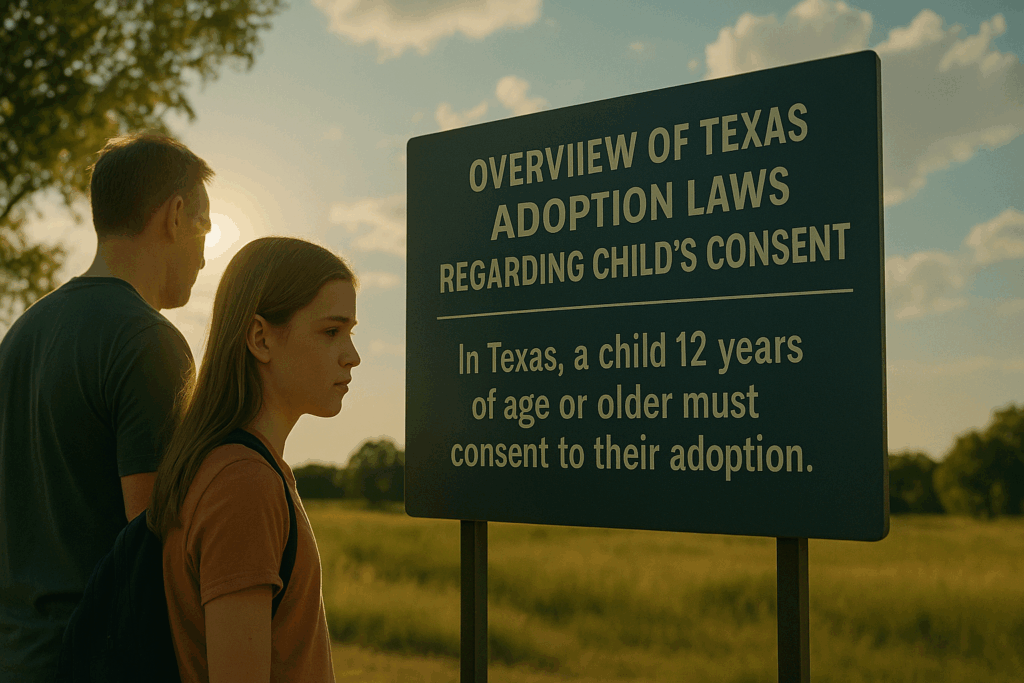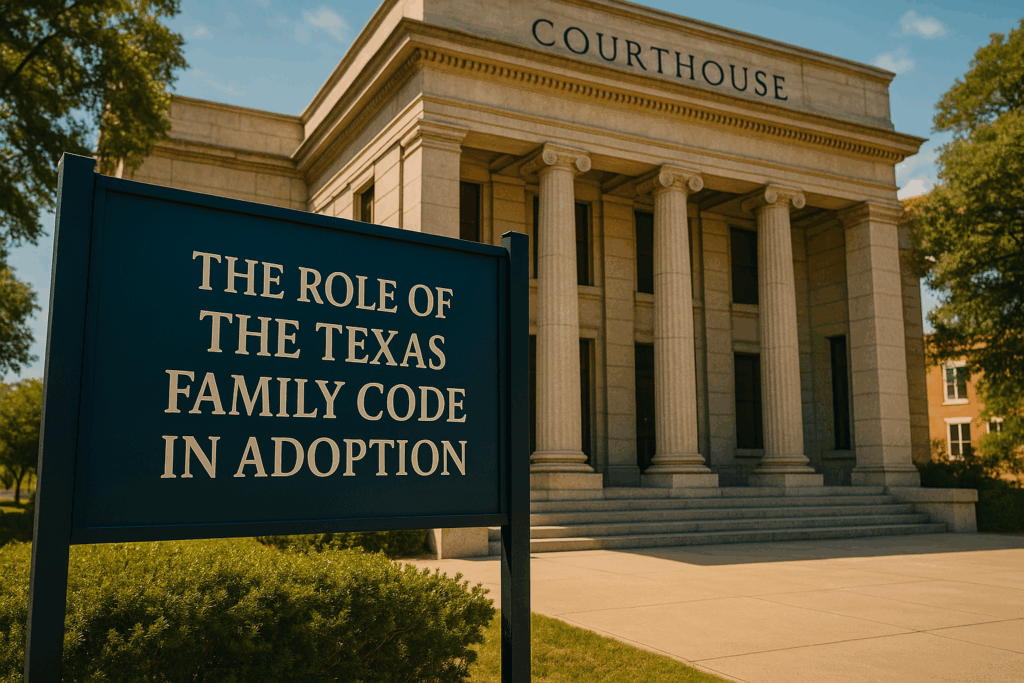
Imagine this: You’re considering adoption, and suddenly you’re faced with an important question — When the Child Must Consent to a Texas adoption? In Texas, children aged 12 or older must give their written consent before the adoption can move forward. But why is this such an important step, and how does it impact the process? Well, it’s all about ensuring that the child’s voice is heard when a decision that impacts their future is on the table. While the age requirement seems straightforward, there are several nuances and exceptions that can complicate the matter, which makes it critical for adoptive families to understand the legal framework.
In this blog, we’re diving into the ins and outs of when the child must consent to a Texas adoption, why this rule exists, and what it means for everyone involved. From the emotional side of things to the legal aspects, you’ll learn how Texas courts protect a child’s well-being and ensure the process is in their best interest. Whether you’re navigating the adoption journey or simply curious about the legalities, we’ll help clear up any confusion and offer insights into the steps that ensure a smooth and supportive adoption process.
Key Takeaways
- In Texas, children aged 12 and older must provide written consent for adoption, ensuring their voice is included in decisions affecting their lives.
- The Texas Family Code governs the adoption process and mandates that both biological parents must consent unless certain conditions apply, with a focus on the child’s best interests.
- Legal guidance is crucial in navigating the complexities of adoption in Texas, including obtaining necessary documentation and addressing potential parental consent conflicts.
We’re Here to Help—Schedule Your Consultation
Every family law case is unique. Let’s discuss your situation and explore your options. Book an appointment today to get started.
Legal Age for Child’s Consent in Texas Adoption
In Texas, when the child must consent to a Texas adoption is clearly defined by Section 162.010 of the Texas Family Code, which states that a child who is 12 years or older must provide written or in-court consent before an adoption can proceed. This legal requirement reflects the state’s commitment to protecting the rights and emotional well-being of older children by ensuring they have a say in this significant life transition.
As our family law team often explains, this consent isn’t just a legal formality—it’s a meaningful safeguard. It ensures that the child is emotionally ready and willing to become part of a new family structure. Adoptive parents must be prepared to approach this conversation with care and transparency, as the child’s comfort and understanding are central to a successful adoption.
The child’s consent requirement also underscores the broader principles behind Texas adoption law: protecting the best interests of the child while maintaining the integrity of the legal process. Failure to obtain proper consent can result in delays or even legal challenges, making it essential for families to work with knowledgeable professionals throughout every step. For a closer look at the legal essentials, see our full guide: Who Must Provide Consent to a Texas Adoption.
At The Law Office of Bryan Fagan, PLLC, we’re here to guide families through these important steps with both legal precision and compassionate care. If you’re navigating the adoption process, or considering it, you may also find value in our resource on how Texas courts evaluate a child’s best interests. We believe in empowering families with the knowledge and support they need to move forward with confidence.

Exceptions to the Age Requirement
While the general rule is that children 12 years or older must consent to their adoption, there are exceptions. The court has the discretion to waive this requirement if it determines that obtaining the child’s consent is not in their best interest. Such decisions are typically influenced by the child’s maturity and specific circumstances surrounding the case.
For instance, if a child under 12 demonstrates sufficient maturity and understanding, the court may decide to consider their views. Conversely, in situations where the child’s emotional or psychological state might be adversely affected by requiring their consent, the court waives this requirement to protect the child’s wishes and well-being.
Ultimately, the court’s primary responsibility is to ensure that all actions taken are in the best interest of the child.
The Role of the Texas Family Code
The Texas Family Code plays a central role in guiding every step of the adoption process, especially when the child must consent to a Texas adoption. Under Section 162.010 of the Texas Family Code, children aged 12 or older must give written or in-court consent for the adoption to proceed. Additionally, Sections 162.001 through 162.011 outline the necessary procedures for obtaining parental consent, terminating rights when applicable, and filing the appropriate legal documents. These statutes ensure that everyone involved understands their rights and responsibilities before an adoption can be finalized.
According to the attorneys at our firm, one of the most critical components of this process is the proper completion and submission of consent forms and affidavits. These legal documents are more than paperwork—they serve as official declarations that confirm each party’s agreement to the adoption. Filing them accurately and on time is essential to receiving court approval and avoiding unnecessary delays. For a step-by-step explanation of this process, we recommend reviewing this detailed guide on filing Texas consent to adoption forms.
Adoptive parents who understand and comply with the Texas Family Code are far better equipped to navigate the legal landscape with confidence. Whether you’re adopting through an agency, independently, or as a stepparent, following the proper legal channels ensures that your adoption plan is secure and compliant with state law. Knowing exactly what forms to file and when can prevent setbacks that might otherwise delay the finalization of your adoption.
To learn more about building a legally sound and emotionally supportive adoption plan, take a look at our blog on how to prepare for an adoption home study in Texas. At The Law Office of Bryan Fagan, PLLC, we are committed to providing families with clear, compassionate legal guidance—so you can focus on what matters most: creating a safe and loving home.

Court’s Discretion and Best Interests of the Child
When it comes to adoption, the court’s discretion is paramount, with the child’s best interests being the guiding principle. Texas courts prioritize the child’s emotional and physical needs, considering various factors to ensure that the adoption will serve the child’s well-being. This often involves psychological evaluations to assess the child’s readiness and emotional state, ensuring that they can make an informed consent.
Judges have the authority to go beyond established guidelines, taking into account additional factors that might influence the child’s best interests. Professional assessments, including mental health evaluations, are critical in this process, as they provide a comprehensive understanding of the child’s emotional and psychological readiness for adoption.
This thorough evaluation process helps create a supportive environment that meets the child’s needs and fosters a positive parent-child relationship.
Practical Scenarios Requiring Child’s Consent
In Texas, the requirement for a child’s consent becomes particularly significant in various practical scenarios. For example, in cases of stepparent adoptions, the child’s agreement is essential, especially if they are over the age of 12. This consent underscores the child’s role in the adoption process, ensuring that their wishes and feelings are considered and respected.
Another scenario where a child’s consent is crucial involves agency adoptions. Licensed adoption agencies often require written consent from children aged 12 and older, reflecting the legal requirements set forth by the Texas Family Code. These practical examples highlight the importance of including the child in the decision-making process, fostering a sense of involvement and acceptance of their new family dynamics.
Case Studies: Successful Adoptions with Child’s Consent
Numerous case studies illustrate the positive outcomes of adoptions where the child’s consent was actively sought and respected. In one case, a 13-year-old boy was placed in a loving adoptive home after expressing his desire to be adopted. His active participation in the adoption process led to a smoother transition and a stronger bond with his adoptive parents.
Another successful adoption involved a 12-year-old girl whose consent and emotional readiness were thoroughly assessed before the adoption agency. Counseling services helped her navigate her feelings as an adopted child, leading to a positive adjustment in her new family environment during her adoption journey, which also reflects the experiences of many adopted children.
These stories underscore the importance of prioritizing the child’s consent and readiness, ensuring a supportive and loving adoptive family.
Balancing Child’s Rights and Adoptive Family’s Interests
Balancing a child’s rights with the hopes of an adoptive family can be complex—but it’s at the heart of Texas adoption law. When courts evaluate adoption cases, including when the child must consent to a Texas adoption, they are guided by the overriding principle of the child’s best interests, as outlined in Section 162.016 of the Texas Family Code. This section, along with others in Chapter 162, reinforces that the child’s emotional well-being, maturity, and willingness to join the adoptive family must be carefully considered before moving forward.
As our family law team often advises, this balance isn’t about choosing one party’s interests over another—it’s about finding a path that promotes emotional security and long-term stability for the child. Texas law calls for detailed evaluations of both the adoptive family’s capacity to provide a nurturing environment and the child’s psychological readiness for the change. This is especially true in situations involving stepparent adoption, where one biological parent may not be willing to give consent. To better understand how to navigate those challenges, visit this helpful article on stepchild adoption when the other parent won’t consent.
Consent isn’t just about meeting legal standards—it’s also about respecting the child’s role in the family dynamic. When the child is 12 or older, their written or in-court consent is legally required under Section 162.010 of the Texas Family Code, making their involvement essential to the outcome. This approach ensures that every adoption moves forward with the child’s voice at the center and lays the groundwork for a stronger parent-child relationship from the start.
For more on how the Texas Family Code shapes decisions in adoption and custody cases, we also encourage you to explore our blog on how courts weigh the best interests of the child in Texas family law. At The Law Office of Bryan Fagan, PLLC, we’re here to help families navigate the legal process with clarity and compassion—because every child deserves a future built on trust and stability.

Psychological and Emotional Readiness
Assessing a child’s psychological and emotional readiness is a critical step in the adoption process. In Texas, obtaining the consent of a child aged 12 or older is mandatory, reflecting the importance of their emotional state in the adoption proceedings. Counseling sessions can help children articulate their feelings and understand the adoption process, leading to smoother transitions into their new families.
One case study highlighted how involving a child in discussions about the adoption led to better acceptance and adjustment in their new family. Another successful adoption story emphasized the positive impact of maintaining a good relationship with both biological and adoptive parents, contributing to the child’s overall happiness and well-being post-adoption.
These examples underscore the importance of prioritizing the child’s emotional readiness and involvement in the adoption process.
Legal Steps for Obtaining Child’s Consent
When pursuing adoption in Texas—especially when the child must consent to a Texas adoption—following the correct legal steps is absolutely essential. Under Section 162.010 of the Texas Family Code, any child age 12 or older must provide written or in-court consent for the adoption to proceed. In stepparent adoptions, this requirement is paired with the need to either obtain the consent of the non-custodial biological parent or pursue a termination of their parental rights under Section 161.001 if certain legal grounds exist.
As our family law team often advises, stepparent adoptions can be particularly emotional and procedurally complex. You’ll need to involve the child’s legal guardian (if applicable), prepare official consent forms, and file everything correctly with the court to avoid delays. The process requires attention to detail and a deep understanding of the Texas Family Code, which is why working with a qualified family law attorney can be invaluable. For a comprehensive look at how these cases unfold, we recommend reading this step-by-step overview of stepparent adoption in Texas.
Beyond ensuring all documents are legally sound, an experienced attorney can help guide families through the more sensitive aspects of consent—particularly when a child is navigating big emotions or uncertain about the changes ahead. It’s not just about filing paperwork; it’s about building a legally secure and emotionally thoughtful adoption plan.
To explore related concerns, such as what happens if a biological parent refuses to consent, check out our blog on stepparent adoption obstacles and solutions in Texas. At The Law Office of Bryan Fagan, PLLC, we’re here to walk families through every phase of the adoption journey with trusted legal support and compassionate care.

Documentation and Affidavits
Proper documentation is crucial in the adoption process. In Texas, consent forms must be filed with the court to formalize the child’s consent for adoption. These forms serve as official records that validate the child’s agreement and are essential for the legal adoption proceedings.
Affidavits are often required to affirm the validity of the consent documents, providing an additional layer of legal assurance. By ensuring that all necessary legal documents are accurately prepared and filed, prospective adoptive parents can facilitate a smoother and more efficient adoption process.
When Parental Consent Conflicts Arise
Conflicts in parental consent can complicate the adoption process. In Texas, both biological parents must consent to the adoption unless their rights have been terminated or one parent is deceased or unlocatable. Contested adoptions often arise when one biological parent agrees to the adoption while the other retains their parental rights.
In such cases, the court typically prioritizes the child’s best interests, resolving the conflict by considering the child’s wishes and overall well-being. The voluntary termination of parental rights is often a necessary step before an adoption can proceed, particularly when there are disputes between the child’s biological parents, and when parental rights are legally terminated. This process also involves understanding biological parents rights.
Termination of Parental Rights
The termination of parental rights can be sought on grounds such as abandonment, unfitness, or endangerment. The court can issue termination orders if a father’s identity or location is unknown. This action follows a diligent search for the father. This legal step is crucial for ensuring that the adoption process can proceed without impediments from conflicting father’s parental rights terminated and involuntary termination.
Children’s caseworkers play a vital role in preparing the child for adoption by involving them in discussions about their feelings and expectations related to the transition. This preparation helps the child navigate the emotional complexities of the adoption process, fostering a smoother transition into their new family.
Importance of Legal Guidance
Adoption is one of the most rewarding—but legally intricate—paths a family can take. When navigating moments like when the child must consent to a Texas adoption, having the right legal guidance makes all the difference. According to Section 162.010 of the Texas Family Code, a child who is 12 years or older must give written or in-court consent before the adoption can be finalized. Whether you’re pursuing a private adoption or a stepparent adoption, this step is just one part of a broader process that requires careful legal attention.
As our attorneys regularly advise, working with an experienced Texas family law attorney ensures that all statutory requirements are met and that your adoption proceeds without unnecessary delays or costly errors. From preparing consent forms to handling the termination of parental rights under Section 161.001, adoption attorneys play a vital role in managing the legal complexities that often arise—especially in contested or emotionally sensitive cases. For families exploring stepparent adoption specifically, this resource on stepparent adoptions in Texas offers a detailed overview of what to expect.
Legal representation not only helps minimize risk but also provides the reassurance of knowing your case is being handled with care and precision. This is especially important in contested adoptions, where the outcome can significantly affect the child’s stability and the adoptive family’s future. With professional legal support, you’re better prepared to meet every requirement, from court filings to compliance with Texas Family Code provisions.
For more insights into the adoption process and your rights as a stepparent or guardian, we invite you to visit our blog on Texas adoption home studies and court preparation. At The Law Office of Bryan Fagan, PLLC, we’re proud to help Texas families build secure futures—one thoughtful legal step at a time.

Conclusion:
Adopting a child is an exciting, life-changing decision, and understanding the legal aspects of the process is just as important as the emotional journey. When the child must consent to a Texas adoption is one of those essential details that can make all the difference in ensuring the process goes smoothly and that everyone feels supported. By knowing the requirements and exceptions, adoptive families can navigate the path forward with confidence, knowing their child’s needs and rights are being prioritized.
If you’re in the midst of this process or even just exploring your options, remember: having the right legal guidance can make a world of difference. At The Law Office of Bryan Fagan, PLLC, we’re committed to educating families, helping them understand their rights, and making sure that the adoption journey is as smooth and positive as possible. Whether you need advice on consent, navigating complex legal procedures, or simply want someone to walk you through the process with a friendly, professional hand, we’re here to help.
So, as you take the next steps, know that you’re not alone. Whether it’s your first step into adoption or you’ve already started the journey, reach out to a trusted Texas family law attorney. You deserve the peace of mind that comes with knowing your family’s future is in good hands.
Frequently Asked Questions about Adoption in Texas
What are the rules for adoption in Texas?
In Texas, adoption rules are governed by the Texas Family Code. The process requires the consent of both biological parents unless one or both parents’ rights are terminated. The child’s consent is required if the child is 12 years or older. A thorough home study is also required, and the adoption must be finalized in a Texas court.
Does adoption require consent of the child?
Yes, in Texas, children aged 12 and older must consent to adoption. This consent must be given in writing or in court. If the child is younger than 12, consent is not required, but their wishes may be considered, depending on the child’s maturity and understanding of the situation.
Can a child be adopted without the father’s consent in Texas?
In Texas, a child cannot be adopted without the father’s consent unless the father’s parental rights have been legally terminated. This can happen if the father has abandoned the child, failed to provide support, or is otherwise unfit to parent.
When should a child be told they are adopted?
The ideal time to tell a child they are adopted is when they are developmentally ready to understand the concept. For most children, this happens around the ages of 3 to 5, but each situation is different. It’s important to approach the conversation with sensitivity and age-appropriate information.
What is the 3 3 3 rule for adoption?
The “3-3-3 rule” refers to the common guideline that suggests adopting a child from a different culture or background requires three months of bonding, three years of support and adjustment, and three generations of stability. This rule is a general guideline for adoptive parents to understand that adoption is an ongoing journey, not just a one-time event.
Can a biological parent regain custody after adoption in Texas?
Once an adoption is finalized in Texas, the biological parents’ rights are permanently terminated, and they cannot regain custody. The adoption creates a new legal relationship between the child and adoptive parents, and the biological parents have no legal right to reclaim custody unless there was a legal error in the adoption process.
Can children refuse adoption?
In Texas, children aged 12 or older must give consent to their adoption. If they refuse, the adoption cannot proceed. However, younger children may express their feelings about the adoption, and while their consent is not legally required, their emotional readiness and comfort should be taken into account.
What is informed consent for adoption?
Informed consent for adoption means that all parties involved—biological parents, adoptive parents, and the child (if applicable)—understand the implications of the adoption process. It includes the legal rights being transferred, the responsibilities of the adoptive parents, and the potential emotional effects on the child. Informed consent ensures that everyone involved is fully aware of their roles and the long-term consequences of adoption.
Can a parent force a minor to give a baby up for adoption in Texas?
No, in Texas, a parent cannot force a minor to give up a baby for adoption. The minor mother must provide voluntary consent for the adoption, and she must fully understand the implications of her decision. Texas law ensures that a minor’s rights are protected during the adoption process, and they cannot be coerced into placing their child for adoption.
Bryan Fagan is a Texas family law attorney with a heart for adoption—inspired not just by his legal career, but by his own family story. Growing up in Atascocita with two adopted brothers, Bryan learned early the profound meaning of chosen family. His passion for justice was sparked by John Grisham’s The Pelican Brief, and he became the first lawyer in his family, balancing night classes at South Texas College of Law while caring for his grandmother with Alzheimer’s.
Today, Bryan brings that same dedication to his practice, guiding families through adoptions, custody disputes, divorces, and complex marital agreements. A certified member of the College of the State Bar of Texas, he combines elite legal expertise with genuine empathy—drawing from his roles as a husband, father of three, and advocate for families facing false CPS allegations.
Based in Houston, Bryan is actively involved in the Houston Bar Association’s Family Law Sector and statewide family law organizations. Whether finalizing an adoption or protecting parental rights, he believes the law should reflect the deepest values of home, commitment, and love.

